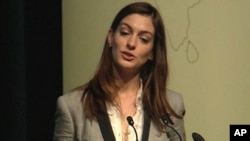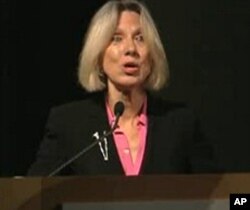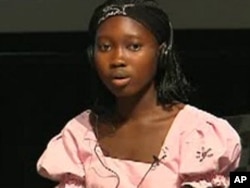The Adolescent Girls Initiative partners the World Bank, the Nike Foundation and governments of developing and developed nations to empower girls in poor countries. The two-year-old program is helping girls in Asia, Africa and the Middle East gain the education and skills they need to transition into the workforce.
"My name is Sanchita. I come from a small village called Ishwarpur in Bangladesh," American actress Anne Hathaway delivered her lines as powerfully from behind a podium at the World Bank as she does on the silver screen, telling the story of an impoverished girl.
"When a baby is born in Ishwarpur, families desperately hope it will be a boy," she continued. "It has been this way for as long as anyone can remember. It is believed that boys will contribute to the family income in a place where people are very poor."
These circumstances are familiar to those who benefit from the Adolescent Girls Initiative.
Who benefits?
A dozen such teenage girls and young women visited the World Bank from developing Asian, Middle Eastern and African countries. They were just a few of the girls who benefit from training and education programs that help them transition from school to employment.
Hathaway told the audience that, with the help of a development organization, Sanchita gained an education and borrowed $60 to buy a cow and start a vegetable garden. The teenage girl could then afford to pay her own school fees, as well as her brother's, and contribute to her family in such a way that Sanchita's parents hope she does not marry any time soon.
Hathaway spoke of her own childhood in a comfortable suburban U.S. neighborhood, and of a time when she had no idea about the kind of circumstances Sanchita faced nor how much girls need safe spaces for education.
"Places that could teach them how to take the light they have as girls and ignite the world," explained Hathaway. "I wouldn't know how much the world needs 'The Girl Effect.'"
Girl power
"The Girl Effect" is what the Adolescent Girls Initiative wants to see happen for 600 million girls in developing countries. Overall, an estimated one-third of young women in developing nations are not employed and not in school.
World Bank President Robert Zoellick said underinvesting in girls impedes development. He added that educating girls also makes sense for poor families, noting that an extra year of secondary schooling can raise their wages by 10 to 20 percent.
"If they earn greater income they also have greater access to reproductive health information and services, so then more likely to delay marriage and childbirth, have healthier babies and attain higher literacy rates," Zoellick said. "The evidence strongly suggests that investing in adolescent girls is a key way to break inter-generational patterns of poverty."
Current operations
The Adolescent Girls Initiative public-private partnership, with its $20 million in funds, is already at work in seven countries, with plans to expand to Haiti and Yemen.
"So where we are in Liberia and Nepal, young women are completing the first rounds of training," explained Mayra Buvinic, director of Gender and Development at the World Bank. "In South Sudan, 100 adolescent girls' clubs will have opened in four states by the end of this month. In Jordan, female community college graduates are gaining access to vouchers. In Afghanistan, Lao PDR and Rwanda, assessments are being completed, and the projects will be launched at the end of this quarter."
Thanks and praise
Kebbeh Kamara said she has benefited from training in Greater Monrovia, Liberia. Wearing a pink dress and sporty black headband decorated with rhinestones, she addressed the World Bank audience from the stage.
"I learned how to start a business, how to earn money on your own, how to be self-sustainable," she said, "how to save money and what to spend money for."
Sarah Poni Saturnino, 19, of Juba, Southern Sudan, told VOA she is enjoying her first trip to the United States and all the empowerment training and activities. She said she hopes to take the lessons she has learned here in workshops back to the Adolescent Girls Initiative clubs in Southern Sudan.
"I learned about how to express yourself. Eye contact. Speak loud," explained Saturnino. "This way can give me really a voice to speak in front of people. And even if I go back home, I'm not longer Sarah again -- I'm somebody now."
Somebody who has earned the admiration of a fellow Southern Sudanese citizen, child-soldier-turned-rapper Emmanuel Jal. A supporter of the Adolescent Girls Initiative, Jal performed at the World Bank event.
The girls joined him on stage, beaming as they danced behind him -- as did at least one World Bank official -- while the audience of staffers in business suits took to their feet and raised their hands in the air as well.






